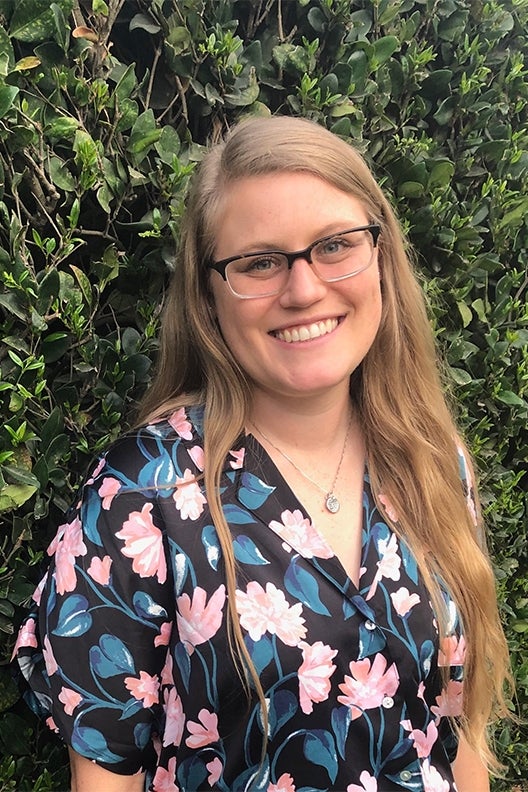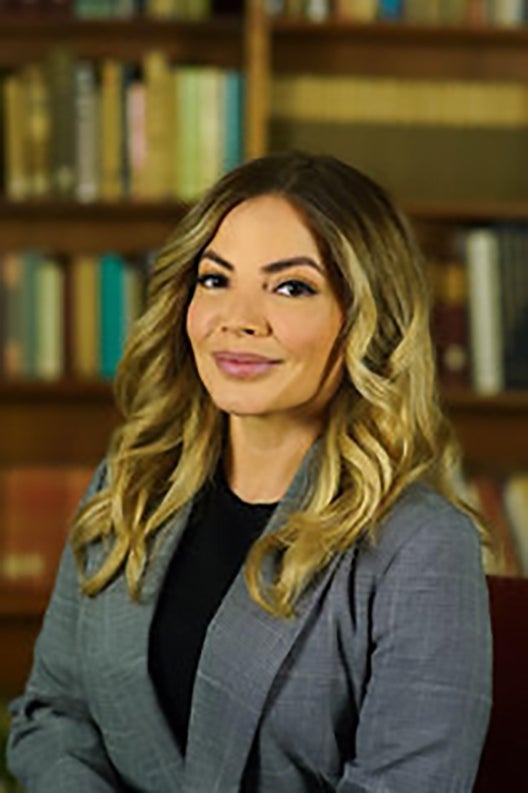Cynthia De La Rosa looks forward to building community on campus. Kristin Yinger is eager to collaborate with other students and faculty members. And Rubysela Rodriguez? She is excited to be introduced to new ideas, and to grow as a scholar.
All Ph.D. students who recently arrived at UC Santa Barbara, Rodriguez (education), De La Rosa (Chicana/o studies) and Yinger (art history), along with Janelle Arnold (chemical engineering), are the Graduate Division Racial Justice Fellows for 2023-2024.
Now in its third year, the Racial Justice Fellowship Program awards four new graduate students each year with funding and mentorship for teaching and research on racial justice. Fellows, nominated by their departments during their recruitment outreach, each receive an $8,000 summer stipend for the first three years of their program, in addition to a five-year, fully-funded support offer.
“Launched in the wake of the killing of George Floyd, this program brings to campus students who continue their passionate commitments to racial justice in the form of teaching, research and mentoring,” said Leila J. Rupp, Interim Anne and Michael Towbes Graduate Dean. “Such broad support for recruiting these exceptional students speaks to the centrality of social justice writ large to UC Santa Barbara.”
The program is a campus-wide collaboration supported by the Graduate Division, donors, and the deans of the Bren School; the College of Engineering; the Division of Humanities and Fine Arts; the Division of Social Sciences; the Division of Mathematical, Life, and Physical Science; and the Gevirtz Graduate School of Education.
Born in Tepic, Nayarit, Mexico De La Rosa was raised in a low-income community in North County San Diego. She is a Sally Casanova Scholar who earned her master’s degree in sociological practice from California State University, San Marcos, before pursuing her doctoral research at UCSB in Chicana/o studies.
“Receiving the Racial Justice Fellowship is a true honor as it will help alleviate some of the financial hardships I face as a first-generation graduate student,” she said. “My intersecting identities as a working-class, immigrant, first-generation Latina scholar have motivated me to pursue a career where I can give back to my community through research, teaching, and mentorship. By receiving this fellowship, I am encouraged to continue to advocate for my community and to produce the work needed to bring justice to crossover youth who are constantly neglected by the state.”

Yinger, who is pursuing her doctorate in art history, received a master’s degree in the history of art from the Courtauld Institute of Art in the United Kingdom.
For over six years, she has taught media arts, literature and AP Art History at an all-girls high school, and has worked at a small non-collecting art museum and at Catholic high schools in the Los Angeles area. She is eager to work alongside other graduate students and professors through interdisciplinary independent study, being a part of a challenging research and teaching community, and having access to resources for her work in modern and contemporary art.
“After graduation and moving back to California, I realized I wanted to put my experience and knowledge into arts education,” she said. “In my teaching and mentoring experiences at the high school level, I have been able to serve students of historically disadvantaged backgrounds in south central Los Angeles, primarily women of color, to assist them on their journeys to higher education. This fellowship allows me to pursue my future art historical scholarship and teaching work towards fleshing out ‘alternative histories’ (i.e. queer histories, feminist histories and those of historically underrepresented groups), decentering whiteness and maleness in the discipline, and increasing accessibility to art, art spaces, and arts education.”
Pursuing her Ph.D. in the Gevirtz Graduate School of Education, Rodriguez’s own path through higher education was not a straightforward journey. She grew up in a working class, tight-knit immigrant family who were not familiar with the college experience. After high school, she worked while attending her local community college, but she eventually dropped out and worked full-time.
“After many years doing work that did not fulfill me personally, with the encouragement of my husband, I decided to give school another go,” she said.

“I enrolled in a community college where I thrived and transferred to a Cal State, where I continued to do well. There, I was introduced to a program dedicated to promoting minoritized students into graduate school. That program changed the trajectory of my life and led me to pursue a doctoral degree here at UCSB, where I hope to conduct research that empowers other minoritized students.”
This fellowship means a lot to Rodriguez not only because of its financial benefit but because it specifically acknowledges research that is conducted within marginalized communities. “Too often, minoritized communities are absent in the literature, and the fact that the Racial Justice Fellowship recognizes scholars doing work in these communities means a lot to me,” she said.
UCSB staff, faculty and students will get a chance to meet past and present program awardees — and hear about their research and other initiatives — at the 2024 Racial Justice Symposium during the winter quarter.
Marge Perko
margeperko@ucsb.edu



